- Home
- William Golding
Free Fall Page 6
Free Fall Read online
Page 6
“Bet you wouldn’t.”
“Would.”
“Wouldn’t.”
I’d break a policeman’s window, see?
Philip introduced the subject of the church. It was autumn and growing dusky. It was the right hour for a desperate deed.
No, not the window, said Philip; but he bet and he bet. So we moved by dare and vaunt and dare and vaunt until I was where he wanted me. Before the light had drained down and the dusk turned to darkness—I might lick every boy in the school but not this, I wouldn’t, I wouldn’t dare—honest, Sammy, you better not! and giggling, appalled and flapping his hands at awed promise of an accident——
“I would, then, see? I’d piss on it.”
Giggle flap tremor, heart-thud.
And so by dare upon dare in the autumn streets I found myself at last engaged to defile the high altar. Ο streets, cold with copper smoke and brazen noise, with brown profile of warehouse and gasworks glory be for you under the eternal sky. Glory be for the biggest warehouse of all, huddled away from the shining canal among trees and bones.
Philip led the way with his dance and flap and I followed in the net. I was not cold particularly but my teeth had a tendency to shake in my mouth if I did not clench them. I had to cry to Philip to wait a bit under the bridge over the canal and I made concentric, spreading circles in the water and a speck of foam. He ran ahead and came back like a puppy, for all the world as if I were the master. As we went, I found that something seemed to be wrong with my guts and I had to stop again in a dark alley. But Philip danced round me, his white knees gleaming in the dusk. I wouldn’t, he bet.
We came to the stone wall, the lych-gate, the glooming yews. I stopped again and used the wall that the dogs used and then Philip clicked the latch and we were through. He went on tiptoe and I followed with strange shapes of darkness expanding before my eyes. The stones were tall about us and when Philip lifted a longer latch in the yawning porch it sounded like a castle gate. I crouched in after him, hand out to feel him in this thicker darkness but still we were not inside. There was another door, soft-covered; and when Philip pushed, it spoke to us.
Wuff.
I followed still, Philip let me through. I did not know the drill and the released door spoke again behind us.
Wubb wuff!
There were miles of church—first a sense of a world of hollowed stone, all shadow, all guessed-at glossy rectangles dim as an after-image, sudden, startling figures near at hand. I was nothing but singing teeth and jumping skin and hair that crawled without orders. Philip was as bad. His need must have been deep indeed. I could see nothing of him but hands and face and knees. His face was close to mine. We had a fierce and insane argument under the shadow of the inner door with Prayer Books piled on a table at shoulder height.
“It’s too dark, I tell you! I can’t see!”
“You’re a coward then, you can just talk that’s all——”
“It’s too dark!”
We even struggled there, unhandily, I made impotent by his unpredictable female strength. And then it was not too dark. The distances were visible. I cannoned into something wooden with green lights revolving round me; then saw a path stretching and guessed rather than knew that this was the way on. Blasts of hot air blew up my legs from metal grilles in the ground. At the end of the path a clutch of dully shining rectangles went careering away up into the sky and below them there was a great shape. There was a light by the altar jazzing as if a maniac were holding it. Silence began to sound, to fill with a high, nightmare note. There were steps to mount and then a blankness of cloth with a line of white at the top. I ran back to Philip, pattering through the blasts of hot air from the grilles in the floor. We argued and tussled again. The awe of the place was on me; even on my speech.
“But I been three times, Phil—don’t you see? I can’t pee any more!”
Philip raged at me out of the darkness, raged weakly, vilely, cleverly—my brother.
“All right then. I can’t pee. But I can spit.”
I went back through the hot air and a brass eagle ignored me. Though evening had come on there was more light rather than less—enough to show high fences of carved oak on either hand, a carpet, a pattern of black and grey in the stone floor. I stood as near as I dared to the bottom step; but now my mouth was dry, too. I was involutely thankful for that dry mouth. I snatched wildly and legalistically at the hope of another misfire.
Leaning forward, the green lights swimming round me, I made my motions loud so that Philip should hear them.
“Ptah! Ptah! Ptah!”
The universe exploded from the right-hand side. My right ear roared. There were rockets, cascades of light, catherine-wheels; and I was fumbling round on stone. A bright light shone down on me from a single eye.
“You little devil!”
I tried mechanically to get my body on its feet but they slithered under me and I fell down again before the angry eye. Through the singing and roaring I heard only one natural noise.
Wubb. Wuff.
I was being hauled across the stone floor and the eye was dancing a beam of light over carved wood, books and glittering cloth. The verger held me all the way and as soon as he had me in the vestry he switched on a light. It was a fair cop. But I could manage neither the insolence nor the stoicism of Black Hand when unmasked by Sexton Blake and Tinker. The floor and the ceiling could not decide between them on up and down. The verger had me cornered literally in an angle and when he let me go I slid all the way down the wall and was a boneless heap. Life had suddenly rearranged itself. On one side of my head life was bigger and more portentous than on the other. The sky, with stars of infinite velocity and remote noise that patterned their travel had opened into me on the right. Infinity, darkness and space had invaded my island. What remained of normal inspected a light, a wooden box, white cloaks hanging up and a brass cross—looked through an arch, and saw that it was lighted now. This world of terror and lightning was only a church being prepared for an evening service. I did not look at the verger, cannot remember at that time what sort of face he had, saw only black trousers and shiny shoes—for at any moment I might have dropped off the floor and broken my bones on the ceiling by the single electric light. A lady appeared in the arch, a grey lady carrying a sheaf of flowers and the verger talked a lot, calling her madam. They talked about me and by that time I was sitting on a low stool, inspecting the lady in one direction and the universe in the other through the hole that had been blown in the side of my head. The verger said I was another of them. What was he going to do? He had to have help, that was what it had come to and the church must be kept locked. The grey lady looked down at me across whole continents and oceans and told him that the rector must decide. So the verger opened another door and led me through into darkness on gravel. He was talking down to me, I deserved the birch and if he had his way I should get it—boys! They were young devils and getting worse every day, like the world and where it would end he didn’t know and no one else seemed to, either. The gravel felt as if it had been ploughed and my feet were unclever. I said nothing but tried to get along without tumbling over. Then I found the verger was holding my hand instead of my ear and soon after that he was bending sideways with his hand under my elbow and the other somewhere round my waist. He talked all the time. We came to another door and another grey lady who opened it but carried no flowers and the verger was still talking. We went up some stairs and crossed a landing to a big door. This was a bog because I could hear someone straining inside.
“Ooh! Aah-ooh!”
The verger tapped on the door and inside someone scrambled to his feet.
“Come in then, come in! What is it?”
We went through into a dark room over limitless carpet. There was a parson standing in the middle. He was so tall that he seemed to me to ascend into the shadows that surrounded and roofed everything. I looked at what I could with a strange lack of fear or interest. The nearest thing to me was a section of
the parson’s trousers. They were sharply creased except at the knees just below my face where the cloth was rounded and shone like black glass. Once more two people argued above me and my attention, in terms which meant nothing to me and which I have forgotten. I was more concerned with and puzzled by my tendency to lurch sideways; and I thought I would like to kneel down, not because of the parson but because if I rolled into a ball there might be no need to wonder so absurdly about which way up. All I knew was that the parson was refusing to do something and that the verger was pleading with him.
Then the parson spoke loudly and as I now think, with a kind of despair.
“Very well, Jenner. Very well. If I must be invaded—”
I was alone with him. He moved away, sat down in a mother-shaped chair by the dead fire.
“Come here.”
I moved my feet carefully over the carpet and stood by the arm of the chair. He bent his head, beyond the length of black thigh, looked searchingly into my face, examined me carefully from head to foot. He came back at last to my face.
He spoke slowly, absently.
“You’d be a pretty child if you kept yourself clean.”
He gripped the arms of the chair deep and a goose walked over his grave. I saw that he was straining away from me and I looked down in sudden shame for the girl’s word “pretty” and for my so obviously distasteful dirt. We fell into a long silence while I saw that his narrow shoes were turned in towards each other. And on the right-hand side the universe was still roaring and full of stars.
“Who told you to do it?”
That was Philip, of course.
“A little boy like you couldn’t have an idea like that without someone suggesting it.”
Poor man. I glanced up and then down again, I inspected the enormous explanation, saw it was beyond me and gave up.
“Now tell me the name of the man who told you to do it and I’ll let you go.”
But there was no man. There was only Philip Arnold and Sammy Mountjoy.
“Why did you do it then?”
Because. Because.
“But you must know!”
Of course I knew. I had a picture in my mind of the whole transaction that had led me into this position—I saw it in elaborate detail. I did it because that other parson who talked to Philip had made it seem possible that the church contained more excitement and adventure than the pictures; because I was an outcast and needed something to hurt and break just to show them; because a boy who has hit Johnny Spragg so hard that his mum complained to the head teacher has a position to keep up; because, finally, among the singing stars, I’d been, three times and couldn’t pee any more. I knew so many things. I knew I should be interrogated with terrible, adult patience. I knew I should never grow up to be as tall and majestic, knew that he had never been a child, knew we were different creations each in our appointed and changeless place. I knew that the questions would be right and pointless and unanswerable because asked out of the wrong world. They would be righteous and kingly and impossible from behind the high wall. Intuitively I knew this, that the questions would be like trying to lift water in a sieve or catch a shadow by the hand: and this intuition is one of the utter sorrows of childhood.
“Now then. Who told you to do it?”
For of course, when the glamour is gone, the phantom enemies, the pirates and highwaymen, robbers, cowboys, good men and bad, we are faced by the brute thing; the adult voice and four real walls. That is where the policemen and probation officers, teachers and parents achieve the breakdown of our integrated simplicity. The hero is overthrown, remains whimpering and defenceless, a nothing.
How long should I have lasted? Should I have lived up to Tinker? He was frequently threatened with some elaborate form of extinction if he refused to tell. But I was saved at that time from any suspicion of my own inadequacy; for suddenly I wanted to go home and lie down; and then even going home seemed an impossible exertion. The universe bored into my head, the milky way swam past, the green lights of the singing stars expanded and were everything that was.
My memories of that time are confused as mountainous country in misty weather. Did I walk home? How could I? But if I was carried, what arms held me? I must have reached Rotten Row somehow. I went to school next day as usual, I remember that clearly. Perhaps I was not quite as usual. I seem to remember feeling as if I had been drizzled on for a long time and had reached the crisis of whimpering; but there was no rain. There was warmth instead on my right side and a deep throbbing in my right ear. How many days? How many hours? Then, at the end, I was sitting in a classroom and it must have been late afternoon because both the naked lights on their long flexes were switched on. I was tired of the throbbing, tired of school, tired of everything, wanted to lie down. I looked at the paper in front of me and I could not think what I had to write. I heard whispering and knew without understanding, that I was the centre of excitement and awe. A boy in front of me and to the left had his coat pulled and looked round. There was more whispering so that the master moved at his desk. Then Johnny Spragg who was sitting to the right of me got out of his seat and put up his hand.
“Please, sir! Sammy’s crying.”
Ma and Mrs. Donavan knew about earache. There were rituals to be performed. For a while I was an object of interest to all the women in the row. They would gather and nod and look down at me. It comes to me now with faint surprise that we never used our upstairs after the lodger died in it. Perhaps Ma was hoping for another lodger; or perhaps her neglect of the bare room was a symptom of her decline. We had lived and slept downstairs, just as if he were still ticking and fuffing above the whitewashed boards; so I had my earache near the stove which was as comfortable a place as any. Ma kept up a good fire in the centre hole. The lady with the green leathery plant brought in a bucket of coal and some advice. They gave me bitter white pills to swallow, aspirin perhaps; but the universe kept boring in, bringing the earache with it. Things became more than lifesize. I kept trying to get away from the pain but it went with me. Ma and Mrs. Donavan took council with the plant lady and they decided to iron me. Mrs. Donavan brought an iron—perhaps Ma always borrowed?—and it was black, with a piece of brown cloth round the handle. It was really iron too, deeply pitted with rust, and only shiny on the bottom part. The plant lady put a piece of cloth over the side of my head while Ma set the iron on the fire. When she took it off she spat on the shiny side and I saw the little balls of spit dance, dwindle and vanish. She sat by me and ironed the side of my head through the cloth and the plant lady held my hand. Then while I was still accepting the warmth with good faith and hoping the pain would go away, the door opened and the tall parson bowed himself through. Ma took away the cloth and the iron and got up. The pain was worse if anything so that I began to turn on this side and then on that and then lie on my face; and every time I happened to see the tall parson he was still standing in the door with his mouth open. Perhaps they moved and spoke, but I have no memory of it. To my hindsight they seem motionless as a ring of stones. Just then the pain began to knock on the door where I was, my own private, inviolable centre so that I made noises and flung myself about. The parson disappeared and at some remove, over gulfs of fire and oceans of blackness under wild green stars there was a big man in the room who was fighting me, binding me, getting my arms in a hold, fastening me down with terrible strength and saying the same thing over and over again.
“Just the tiniest little prick.”
Behind my right ear there is a new moon of scar and a pucker. They are so old that they feel natural and right. I got them that same day, or at least, before the next morning. There was no penicillin, no wonder-drug to control and reduce infection in those days. If the doctor had any doubt at all he operated for mastoid straight away. I came round in a new place, a new world. I was lying over a bowl, too sick and faint to notice anything else but the bowl, whiteness and a brown, polished floor. The pain was reduced to the same dull throbbing that had made me cry at school; but
now even crying was too much effort. I lay, drugged and miserable with a turban of gauze and cotton-wool and bandages round my head. Ma appeared at some time or other in that period. I saw her then for the first and last time, not as the broad figure blotting out the darkness but as a person. There is a wan sanity about the drugged eye sometimes that the healthy one does not have. In my misery I saw her as a stranger might see her, a massive, sagging creature, mottled and dirty. Her hair was in wisps over her brown forehead, her face was a square-ish, drawn-down mass with a minute fag sticking in one corner of her mouth. I see now the sausage hands, brown, with discolorations of red and blue, clutching the string-bag into her lap. She sat as she always sat, in majestic indifference; but the gas was escaping from the balloon. She had little enough to bring me, for what has a woman to spare who even borrows an iron? Yet she had taken thought and found what she could. There was a pedestal by the head of the bed and she had placed there a handful of rather dirty fagcards—my cherished kings of Egypt.
3
And still I ask myself: “Well. There?” and myself answers: “No. Not there.” He is no more a part of me than any other child. I simply have better access to him. I cannot remember what he looked like. I doubt if I ever knew. He is still this bubble floating, filled with happiness or pain which I can no longer feel. In my mind those feelings are represented by colours; they are as exterior to what I feel, as the child itself. His insufficiency and guilt were not mine. I have my own which sprang out of my life somewhere like weeds. I cannot find the root. However I try I can bring up nothing which is part of me.
The ward was a fine place to be when my head stopped hurting. I got complications, had ups and downs. I was a lifetime in that ward, so that I can switch my mind from the world of Rotten Row to the world of the ward as from planet to planet. I have a sense of timelessness in both places. I cannot remember the doctors or nurses or even the other children at all clearly. Survival in this mode must surely be random or why can I not remember who had the beds to right and left? But there was a little girl who had the bed opposite me. She was tiny and black with tight curls and a round, shining, laughing face. Nobody understood the language she spoke. Now I remember that she had a cot instead of a bed like the older children, because when she stood up at the foot she could hold the top rail and swing up and down. She talked all the time. She laughed and sang, she talked to anyone within reach in her babbling, meaningless talk, talked to doctors, nurses, visitors, matron, children, happily and irrepressibly. She was entirely without fear or sorrow and everybody who saw her loved her. I deduce from the line of bricks that she came, had her graph of sickness, recovered and went. But to me, if I think of the ward, she is always there, a small figure in a white nightdress with two jet black hands and a black, flashing face, swinging and laughing.

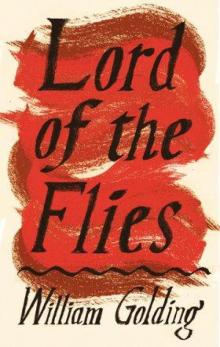 Lord of the Flies
Lord of the Flies To the Ends of the Earth
To the Ends of the Earth Free Fall
Free Fall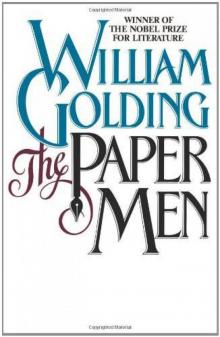 The Paper Men
The Paper Men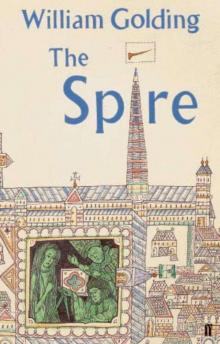 The Spire
The Spire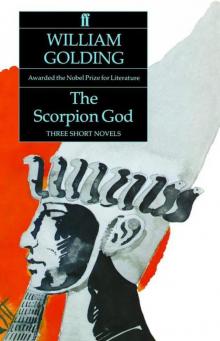 The Scorpion God: Three Short Novels
The Scorpion God: Three Short Novels The Inheritors
The Inheritors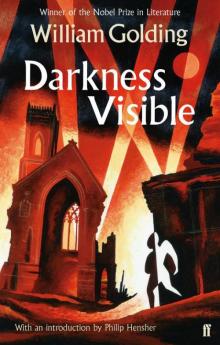 Darkness Visible: With an Introduction by Philip Hensher
Darkness Visible: With an Introduction by Philip Hensher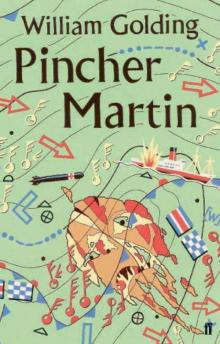 Pincher Martin
Pincher Martin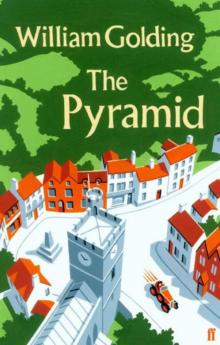 The Pyramid
The Pyramid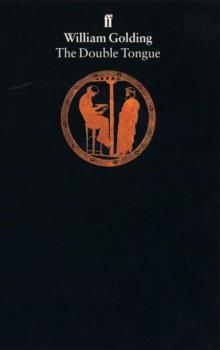 The Double Tongue
The Double Tongue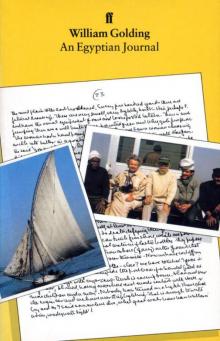 An Egyptian Journal
An Egyptian Journal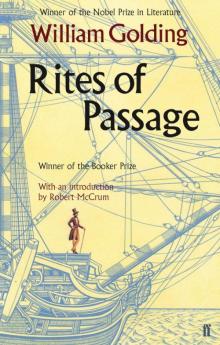 Rites of Passage
Rites of Passage Envoy Extraordinary
Envoy Extraordinary